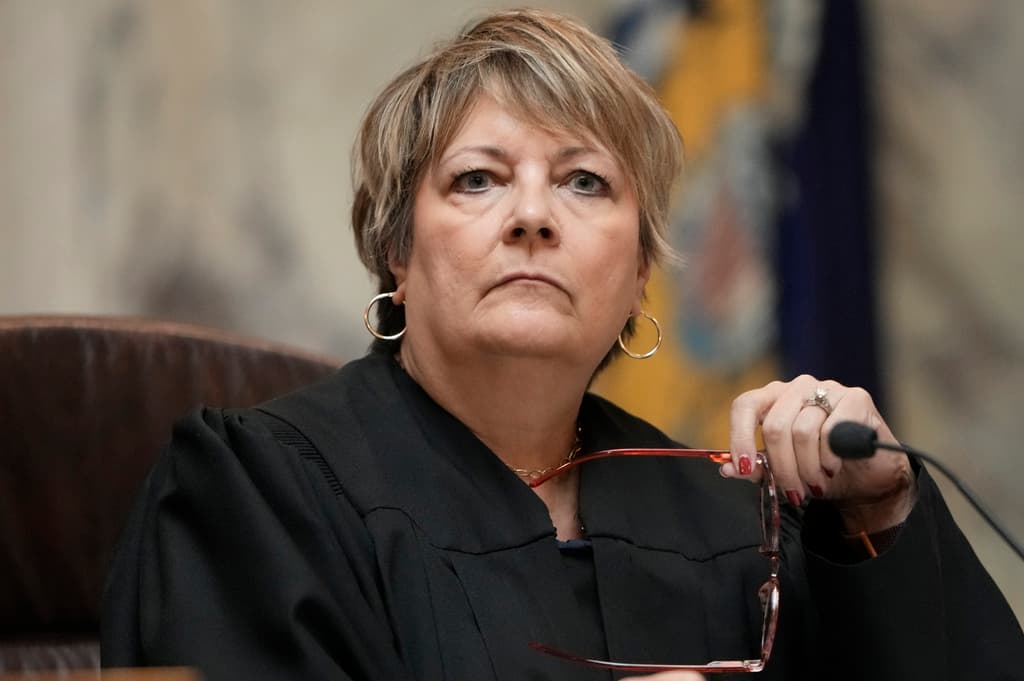Wisconsin Supreme Court To Take Up Gerrymandering Case as GOP Seeks To Oust New Liberal Justice
‘We think the United States Supreme Court precedent compels her recusal, and the United States Supreme Court will have the last word here,’ the state assembly speaker, Robin Vos, says.

The Wisconsin supreme court next week will begin considering a gerrymandering case that some Republicans in the state legislature believe a new liberal justice, Janet Protasiewicz, should recuse herself from hearing. They are threatening to appeal to the U.S. Supreme Court in their efforts to force her off the case.
The lawsuit, Clarke v. Wisconsin Elections Commission, was brought by voters alleging that the state’s assembly and senate districts favor Republicans to the point that they violate the state constitution.
The petitioners claim that a “staggering 55 assembly districts and 21 senate districts — the majority of seats in each chamber of the Legislature — consist of a patchwork of disconnected pieces that do not share a common border with other parts of the same district.”
According to the voters who brought the case, the boundaries violate the state’s constitutional requirement that districts consist of a “contiguous territory.”
At stake is the Republican control of the state legislature and senate. Despite a near-even split in voter sentiment in statewide elections — President Biden carried the state with 49.6 percent to President Trump’s 48.9 percent in 2020 — Republicans control 64 of the state’s 99 house seats and 22 of the state’s 33 senate seats.
The difference between the popular support for the parties in Wisconsin and their representation in state government is so dramatic that organizations like the World Population Review often list the state as among the most gerrymandered in the country.
Ahead of the due date for written arguments next week, Governor Evers filed a motion to intervene in the case, seeking to join the voters who brought the case. Mr. Evers vetoed the same maps being challenged two years ago, but that veto was overridden by the state legislature’s Republican supermajorities.
“The extreme gerrymandering of our legislative maps has shifted power from where it ultimately belongs — with the voters — to the legislators who have drawn the maps,” Mr. Evers said.
If the court rules in favor of the voters in the case, it could provide Democrats with two potential pickups in Wisconsin at the congressional level. Currently, seven of the 10 Wisconsin representatives are Republicans.
“Depending on what happens with the maps, there could be other districts in play as well,” the Wisconsin Democratic Party chairman, Ben Wikler, told reporters over the summer. “Everything kind of depends on where the lines fall.”
While the potential for new congressional maps likely depends on the challenge to the state legislative maps, Democrats could gain nearly enough seats to retake control of the House through challenges to district maps alone in 2024.
The Wisconsin supreme court’s newest justice, Judge Protasiewicz, will be a key figure in any decision handed down from the court. Wisconsinites elected her in August, delivering a majority to liberals on the court for the first time in 15 years, and the case was filed shortly after.
State Republicans have attempted to force Judge Protasiewicz to recuse herself from the case, threatening to impeach and remove her from office. After public backlash over the plan, Republicans backed off from talk of impeachment. Earlier this week, Judge Protasiewicz declined to recuse herself.
State Republicans, responding to the likelihood that the court could rule against the existing maps, announced that they would rework the state’s redistricting process and have a nonpartisan Legislative Reference Bureau draw new maps.
The legislature, though, would still have the final say on what maps are enacted, and because of this, Mr. Evers called the bill “bogus.” The legislature could still override any veto from the governor as it did with the current maps.
While it’s not clear whether state Republicans will push through the new redistricting law, the assembly speaker, Robin Voss, said in a statement Monday that he intends to attempt to compel Judge Protasiewicz to recuse herself.
“Justice Protasiewicz should have recused herself,” Mr. Voss said in a statement. “We think the United States Supreme Court precedent compels her recusal, and the United States Supreme Court will have the last word here.”
Although Mr. Voss has backed off of talk of impeaching Judge Protasiewicz, the statement suggests that he could be planning to bring a lawsuit against her, which could further draw out the battle over the legislative maps.

